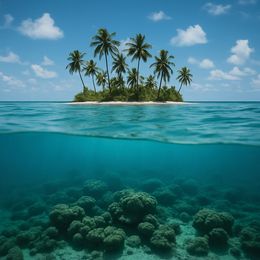These are times when the mind struggles to make sense of things. The old measures are discarded, and the new ones unacceptable. Humanity and decency cower in the corner, arrogance and brute strength play centre stage. Wealth is flung in your face so hard it hurts, empathy is so 20th century: images of uncaring billionaires in their slinkiest and blingiest in Venice compete with those of miserable children in Gaza begging for biscuits under fire.
At such times the mind escapes to faraway places, such as the island nation of Tuvalu. Possibly because I have a story: I once knew a man who knew a man from Tuvalu who had given himself the name “I Lost my Heart in San Francisco.” All of it, passport name. Since then, I see Tuvalu as an idyllic heaven where charming people lead simple lives, where guitar sounds mingle with the roar of azure oceans, where a thousand palm fronds are silhouetted against a setting sun.
Except that even Tuvalu is sinking. Inch by inch the waters are rising around its nine coral atolls; the nation was only six-and-a-half feet above water to start with. In the worst-case scenario—and given the state of the world, I only think of the worst—90 per cent of the main atoll of Funafuti that houses 65 per cent of the population will be underwater by 2050. Tuvalu’s foreign minister had sent a powerful video message to COP26 in 2021 standing thigh-high in water in suit and tie to underline the immediacy of rising sea levels due to global warming. In 2009, the Maldives had made a similar point by holding a cabinet meeting underwater; Marshall Islands and Kiribati are the two other Small Island Developing States (SIDS) that face similar imminent threats in the Pacific where sea-levels have been rising two to three times faster than the global average.
But even before the disappearance of these paradisiacal places, there are threats that would make them uninhabitable. Heightened wave and storm activity are creating challenges of inaccessibility, scarcity of drinking water, degraded farmlands and vector borne diseases. Little wonder then that the SIDS, who have been the least responsible for global carbon emissions, have been battling for attention and climate funding from the tight-fisted developed nations, funding that would help them erect sea walls, raise the ground surface and install desalination plants.
But the battle goes beyond the physical. International law needs to evolve to encompass climate-related changes. What happens to a state’s sovereignty if it goes underwater, its rights over its resources, its membership of UN bodies, its people, culture and heritage? The SIDS have long argued for, and the International Law Commission has reaffirmed in a recent report, the principle of continued statehood: every state has a continuing right to its existence, territorial integrity, self-determination for its people and protection of their human rights. The report also recognises the sanctity of a state’s maritime zones notwithstanding changes in climate-related changes to coastlines.
Even as international legal mechanisms evolve to handle new realities, international cooperation is essential. Australia, in an exemplary good neighbourly gesture, will grant permanent residence to 280 Tuvaluans every year; nearly a third of Tuvalu’s population of 11,000 has put in applications. Tuvalu wants the cap of 280 because it fears brain drain, a position that underlines the spirit of resilience of these islanders: nobody is giving up, despite the apathy of uncaring powers who daily demote the agenda of climate change.
Mr San Francisco may have lost his heart to a Californian beauty, but he will hold on to his land to the last.
The writer is former ambassador to the US.


